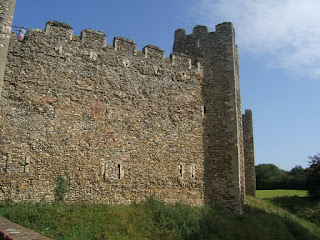I am so excited to be a part of Helen Hollick's 2011 Blog Tour. As many of you know Ms. Hollick is one of my favorite historical fiction writers. I have read and reviewed many of her novels, most recently, The Forever Queen and The Chosen King. When I was offered the opportunity to be included on of this Blog Tour introducing my readers to her Pirate Trilogy, (series will continue after the third voyage) I couldn't resist. Read on to see how you can enter to win your choice of one of the three books in her series.
Today I will have a review for you on Sea Witch, The First Voyage of Captain Jesamiah Acorne. On July 22nd, Helen will join me as a guest to talk about England, her home. Take a moment to glimpse at the trailer. Perhaps you too will become bewitched by the allure of Ms. Hollick's special craft. Prepare to be beguiled.
Review by Wisteria
 SEA WITCH
SEA WITCH The First Voyage of Captain Jesamiah Acorne
Helen Hollick
Silverwood Books (June 20, 2011)
978-1906236601
$16.99, Paperback
316 pages
Of course we all know that pirates are not ordinarily as charismatic as the movies would lead us to believe. But what if they were? Johnny Depp has certainly proved his box office value, irresistible heart tug and memorable character in his Pirates of the Caribbean Series. “Savvy”? Now Helen Hollick introduces adult readers to Jesamiah Acorne an alluring revile for your affections, perhaps even more memorable than any fictionalized pirate in history so far.
Jesamiah Acorne grows up brutally bullied by his half brother Phillipe Moreno who, disgusted by their father’s past, seeks revenge through Jesamiah’s life. Jesamiah finds freedom and the start of a new life as a bold buccaneer taking to the ocean and living on a ship. One day, Jesamiah’s band of pirates fail in the quest to plunder a British vessel. As their plan backfires, Jesamiah peers through his telescope and his eyes rest on the stern of the ship. In the small circle view he spies a figure. He is surprised to see a young girl, a woman, but that can’t be. He experiences an enchantment, unaware that he is bewitched by the white witch, Triola Oldstagh. What he doesn’t realize is that they will meet again, but Triola is well aware of their destiny for she has “the craft.” Triola is not the only woman to seek Jesamiah for herself. Tethys, lives in the ocean deep and is a supernatural spirit of seduction who wants to claim Jesamiah for herself with the passion of the Greek Sirens from mythology. Only Tethys does not want Jesamiah alive.
Helen Hollick takes the reader on a journey of high sea adventures, uniquely envisioned characters and romantic dazzlement. The predestination of the love match between Jesamiah and Triola is always just beyond reach, as Jesamiah is tugged back to the ocean forcing him to choose between his desire for freedom on his ship or his love for Triola. The Sea Witch is a suspenseful romance with sudden surprises, twists and turns and exciting drama that will ride a tide to the end. Jesamiah has that magnetic charm that will raise a twinkle in your eye and captivate your heart with a bold spirit of adventure.
Sea Witch takes place around 1716 in the oceans between Africa and the Caribbean.
Could Triola and Jesamiah be a new love match to live on in historical fiction literature, or will the sultry waves of the wraith Tethys win the spoils? Sea Witch contains a pirate’s treasure of pleasure, highly recommended.
Voyage Two: Pirate Code
Voyage Three: Bring it Close
Voyage Four: Ripples in the Sand (To be released 2011/2012)
 |
| http://www.helenhollick.net/ |
Please join me on July 22nd when Helen Hollick will be my guest as she talks about England, her home.
Contest Rules
- Leave a comment on today's post, or any of the next two tour posts, July 22nd and July 31st. Make sure you leave an encrypted email address if you are the winner. In your comment please let me know which book you would like to win if chosen.
- If you comment on the three different posts you will have three chances.
- 6 additional chances: become a follower of my blog
- 10 additional chances: become a follower on my Facebook Network Blog
- This contest is open Internationally
- Contest ends on August 5th....so don't wait.
Good Luck to Everyone....I hope you enjoy all the voyages!!!

© [Wisteria Leigh] and [Bookworm's Dinner], [2008-2011].










